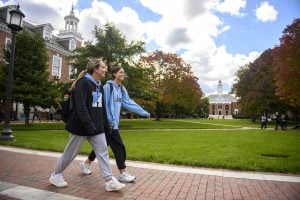
The Whiting School of Engineering’s Department of Chemical and Biomolecular Engineering is set to welcome a record-breaking cohort of 43 new PhD students for the fall semester, representing the largest incoming PhD cohort in the department’s history.
“This is an exciting time for the department,” says Honggang Cui, professor and director of PhD admissions. “This cohort includes students from the top engineering programs in the United States and abroad who have already made many outstanding achievements in the field.”
Schools represented include the University of California, Berkeley; Cornell University; Duke University; the Indian Institutes of Technology (Bombay, Varanasi, and Kanpur); Peking University; the Hong Kong University of Science and Technology; and others.
The department’s incoming class also boasts a wide range of achievements and includes three NSF Graduate Research Fellows, the department’s first Vivian Thomas Scholar Initiative scholar, three Percy Pierre Fellowship winners, and two Dean’s Scholars.
Luis Flores, a member of the cohort from the University of Texas at San Antonio, is a recipient of both the National Science Foundation Graduate Research Fellowship (NSF GFRP)—which financially supports aspiring scientists and engineers pursuing advanced STEM degrees to broaden diverse participation—and the Vivien Thomas Scholars Initiative (VTSI)—which aims to address historic underrepresentation in STEM through academic and financial support.
“I am honored to receive these prestigious awards,” said Flores. “The NSF GRFP serves as a powerful catalyst for my professional career, validating my potential as a researcher. And being a representative of the VTSI program is a tremendous honor and responsibility. I’m a Latino from a low-income region near the Mexican-American border who wants to show those in my community that something as ambitious as a PhD will always be within their reach. These opportunities motivate me to excel in my work and contribute to society.”
Flores hopes not only to eventually start a pharmaceutical company focused on developing novel treatments for neurodegenerative diseases but also to establish a research lab to guide the next generation of scientists.
Shreya Ramesh, who comes to Hopkins from UC Berkeley, where she studied bioengineering and business, said she was attracted to Johns Hopkins Engineering’s program because it will allow her to explore a range of topics in the field, from medical applications to sustainable energy technologies.
“I was inspired by the high caliber of research and collaboration that happens here. All the people that I’ve gotten to meet so far, from professors to other fellow students, have been nothing but amazing,” she said.
Ramesh hopes to be involved in the start-up and entrepreneurship space in the future, perhaps by starting her own company.
“I hope that studying fundamental engineering principles and being involved in interdisciplinary research problems will allow me to think more critically about how to solve some of the world’s problems and connect me with resources that would allow me to do just that,” Ramesh said.
With aspirations that extend beyond the classroom, Flores and Ramesh exemplify the vision and drive of this year’s cohort, Cui said.
“This diverse blend of students will enrich the cultural diversity and intellectual vibrancy of our academic community. I am excited to see the innovative research and collaborative opportunities they will pursue within the chemical and biomolecular engineering department,” he said.